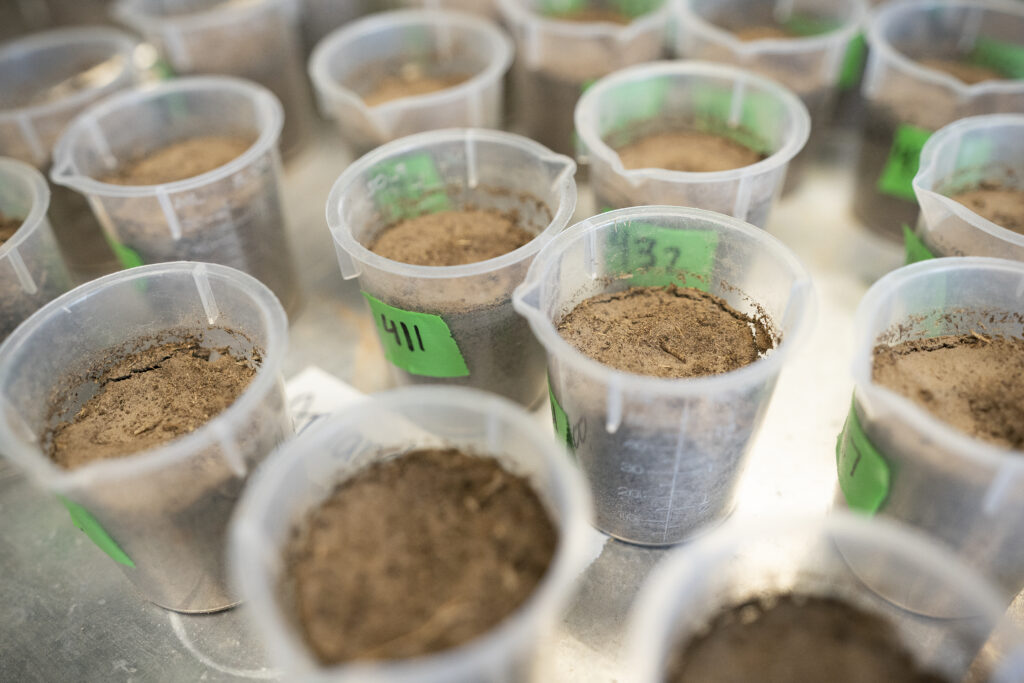Soil chemistry is a discipline of soil science concerned with biogeochemical processes in soils and their influence on the bioavailability, mobility, distribution, and chemical forms of both plant essential elements and contaminants in the terrestrial environment. Traditional soil chemistry (soil fertility) focuses on chemical and biochemical reactions in soils that influence nutrient availability for plant growth, and potential environmental consequences associated with inorganic and organic fertilization, especially with nitrogen and phosphorus. Soil chemistry has increasingly focused on the environment over the past few decades, especially as related to ground and surface water quality. Understanding the reactions and biogeochemical processes of potential pollutants and contaminants in soils will enable a more accurate prediction of fate and toxicity of contaminants, and development of remediation strategies. The overall goal of soil chemistry/fertility research is a more fundamental understanding of chemical and biochemical reactions in soils related to plant growth, sustainability, and soil and environmental quality.

Research Interests
- Develop a better understanding of mechanisms that influence nutrient dynamics in soil, especially those of nitrogen, and management effects on soil organic carbon sequestration.
- Create a foundation for better soil and nutrient management, more efficient crop production, and decreased potential for environmental pollution.
- Nutrient management of land application of animal wastes and biosolids. Reclamation of drastically altered lands, such as lignite surface mined lands. Reclamation of saline/sodic soils.
- Remediation of metals in soils, surface waters, and ground waters; Revegetation of contaminated/disturbed sites.
- Evaluating the plant nutrient requirements and nutrient utilization efficiencies of major crops as affected by factors such as soil physical, chemical and microbiological properties.
- Problems related to soils and nutrient uptake by rice and soybeans, the influence of low oxygen concentrations on germination and plant growth, N transformation in rice soils, environmental quality as influenced by fertilizers, forage production for livestock, rice culture practices.
- Conservation and conventional tillage system/crop rotation interactive effects on carbon sequestration and nitrogen mineralization.
- Crop utilization of fertilizer and organically based nitrogen, phosphorus and iron.
- Water, turf and urban landscape management, effects on water qualities.
- Management of biofuel crops – effects on soil and water quality and greenhouse gas emissions.
Faculty and Staff
Soil Characterization Lab
The TAMU Characterization Lab functions as an integral support facility for faculty, graduate students and the Texas Soil Survey Program. The lab provides full soil physical and chemical analysis. The intended audience includes researchers, extension specialists, educators and service personnel with expertise in soil resources. Data provide baseline soils information for those personnel conducting soil research, soil surveys, interpreting the behavior and management of soils and utilizing these resources for agriculture, ranching, forestry, residential development, road construction, waste disposal and soil reclamation.
For additional information, contact Ms. Donna Prochaska [email protected] at 979-845-7295. Click here for a price list for analyses.
Other Sites of Interest
- Soil Fertility Texas A&M Agricultural Research and Extension Center, Lubbock, TX
- Soil, Water and Forage Testing Laboratory, College Station, TX
- Texas AgriLife Research
Learn More About Research Areas of Focus in Soil and Crop Sciences
In the realm of soil and crop sciences, research focuses on a myriad of critical areas that drive sustainable agricultural practices and global food security. Soil health and management take center stage, exploring ways to optimize soil fertility, structure, and nutrient cycling to enhance crop productivity. Genetic advancements in crop breeding and biotechnology are pursued to develop resilient varieties that withstand environmental stressors and ensure high yields. Precision agriculture, integrating technology and data analytics, aims to fine-tune farming practices, reducing resource waste and maximizing efficiency. The exploration of sustainable agroecosystems delves into the intricate relationships between crops, soil, and the environment, fostering environmentally friendly approaches. Such research not only informs farming practices but also contributes to vital policy discussions, shaping the future of agriculture in a rapidly changing world.